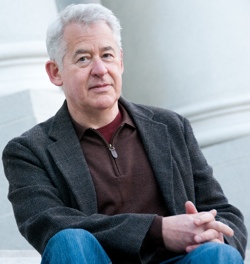 Every day of this extended Cedars rehearsal process is different. It’s astonishing how discrete and unique each day is; I’m sure, when this period is finally over, we will all be able to trace some sort of clear trajectory, but right now the process seems…not random, exactly, in fact far from random, but without any clear day-to-day continuity.
Every day of this extended Cedars rehearsal process is different. It’s astonishing how discrete and unique each day is; I’m sure, when this period is finally over, we will all be able to trace some sort of clear trajectory, but right now the process seems…not random, exactly, in fact far from random, but without any clear day-to-day continuity. Today’s morning session began strongly, but then went flaccid. Jim groped for lines, and lost energy as he went through the scene we were working on, the crucial third scene. There was a lot of extraneous noise outside the rehearsal noise this morning — people yelling, machines churning — and he said that the whole experience felt more like a concentration exercise than a rehearsal. Stage manager Betsey Selman’s attempts to quiet the people outside were only partially successful.
During the lunch break — lunch break for the rest of us, anyway — Jim went for a costume fitting. The script calls for him to be wearing an elegant Italian sports jacket in this scene; the make is even specified (Canali). I assume that’s what he was being fitted for, and I also assume, given the Festival budget, that it won’t really be a Canali.
In any event, he returned in a buoyant mood. His clothing size, he announced, hasn’t changed in 30 years.
He then proposed, and Keira eagerly accepted, a strategy for the remainder of the day. He wanted to abandon the stage for the moment, join Keira and me at the table, and go through each scene individually (some of them are quite long, and all are intricately structured) and determine which parts are connected to one another and which are digressions from the main argument. Since the digressions are often quite long, the places where they begin and end are only evident if one is focusing attention on that particular question. And the exercise turned out to be revelatory, not only for Jim and Keira, but even for the author. The connected bits, and the continuity between them, were always there, but often were the length of only a paragraph or two in the face of digressions that might go on for pages. But by knowing when his character was reverting to his central points rather than trying to avoid confronting them, Jim was able to sustain a smooth sense of flow that had previously been lacking.
He also felt that by taking the piece in more or less bite-sized gulps rather than confronting the mountainous whole, he was less intimidated by the huge task before him, and was able to be looser, freer, more spontaneous. The paradoxical result was that he also achieved more emotional intensity. Keira has been after him for the past week and a half to be more active, more energetic, more situated in the present, and today she was exultant. He had found a pathway toward giving her what she’d been looking for.
Jim is an extremely intelligent actor, and when he was sitting at the table with Keira and me, breaking down the scenes, reading his lines but not really performing them — interrogating them, really — his analysis of the dramatic construction was dead-eye accurate. But it raised an interesting question for me: How much of this was I aware of when I was writing it? And the honest truth is, I can’t remember. I was certainly aware of the moment-by-moment psychological forces driving the character along and often diverting him from his path. But at what point I knew all the incidents and surprises the play contains, how much I had planned before I set down the first word and how much had to be solved along the way…this is lost to me now. The same is true for All Our Yesterdays, my just-published novel. I work from outlines and 3X5 cards and cork boards, and I don’t believe in trusting to improvisation. But I don’t pretend to be able to plan for everything, and after the thing is done, it’s impossible for me to reconstruct the writing process with any precision.
And maybe this is related, but today, as Jim and Keira were analyzing the twists and turns of the character’s ramblings, I discovered things about that character that I must certainly have known subliminally, but had never articulated to myself. Which is one reason why the collaborative process in theater is such a pleasure: In theory, Jim and Keira might be interpreting my words, but as they do so, they are discovering things I myself hadn’t really known. Only a fool would approach the production of a play in any but the humblest of spirits.
Tags: All Our Yesterdays Berkshire Theater Festival Cedars James Naughton Keira Naughton play rehearsals Stockbridge theater









0 Comment